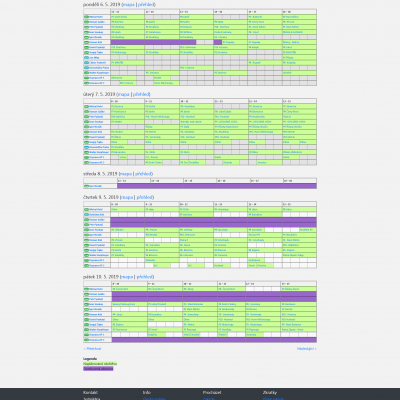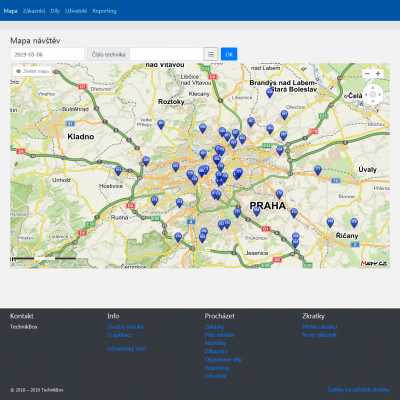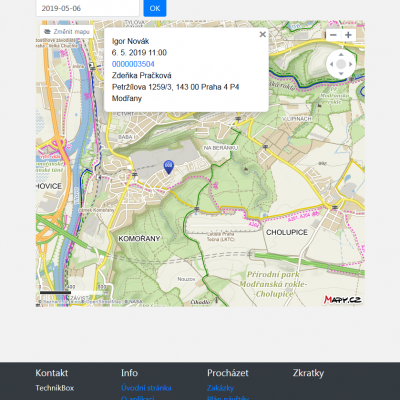
Don’t forget customer service and communication: Improve your soft skills with PEFEK Training, which helps the technicians at AP Service
Well, here I am, I was stuck in traffic, could I get a cup of coffee?” This approach may have worked for technicians years ago but nowadays, customers expect a higher level of communication and higher quality of service.
What are soft skills and why are they so important?
Imagine a typical situation: A client buys a new washing machine or a fridge, either online or in a stone shop, where he only meets the sales assistant. The customer calls the service help line for warranty service or in the event of a break down. The service technician is absolutely the first person the customer will come into face-face-face contact with. The customer relies on the service technician for professional assistance with the given problem, which usually disrupts the smooth running of the whole household.
The client expects the service technician to be:
-
Quick
-
Professional
-
As cheap as possible
The demand for professional service includes both technical hard skills for trouble-free repairs as well as soft skills in the form of the service technician’s overall first impression.
The technician’s approach affects the customer’s overall perception of the brand
The technician’s behaviour, demeanour and professionalism are crucial factors that influence how the customer perceives the brand. The technician is the key person, who communicates with the customer and directly affects his impression, satisfaction and possible, reliable future purchases of the manufacturer’s product.
Therefore, Whirlpool ČR supports the development of its service technicians at authorized services. They for example, cooperate with Pefek Training on the development of technicians at AP Service. This company offers coaching and individual counselling in personal development, soft skills and communication, especially targeting service technicians, managers, sales assistants and other professionals in this market.
What does a technician’s professional approach to a service call entail?
We went straight to Mgr. Pavel Pefek, the executive director and trainer at the same company, for the answer:
Before Arrival
Best case scenario, the service technician should get in touch with the client before arriving on location, for example by text message or mobile to inform the client about the arrival time. In case of a delay, the service technician should apologize and inform the client of the new arrival time. An informed client reacts differently than a client, who is waiting for the technician to arrive at the agreed time but the technician is nowhere in sight. In this case, the client is usually upset, thus already dissatisfied once the technician arrives and it takes a lot more effort to turn this dissatisfied client into a satisfied client.
On location
Best case scenario, the technician should wear clothes with the company’s logo, smell nice, be in a good mood and smile. Upon arrival, the technician should greet the client, introduce the company and introduce himself and his position. Moreover, the technician should verify the client’s name and the basic information about the service call.
Wearing shoe covers upon arrival is a huge added bonus. To begin with, the service technician should briefly inform the client about the course of his stay, verify how the breakdown occurred, verify that the serial number of the client’s equipment corresponds with the number reported to the dispatcher and have the client walk him to the equipment.
The technician has to be able to ask proper questions, preferably open ended questions, express empathy and elements of active listening.
The course of the repair
Once the technician obtains all the necessary information, he should then inform the client about the approximate time of the repair, what exactly he will do and how he will proceed. Once he discovers or verifies the cause of the defect, the service technician has to inform the client about the options and agree on the further steps and the final price for the work, which up until now, was only an estimate acquired from the dispatcher.
During these negotiations, the technician sees the client’s emotions, haste, impatience, pressure on the price of the repair, complaint about a defective product, expecting it to last longer since it’s a brand name and many other communication situations that the service technician should be able to handle with empathy, calmness, assertiveness and problem-solving.
The service technician certainly cannot let his emotions take over. He cannot raise his voice, he cannot get into an argument or use vulgar language. He cannot treat the client arrogantly or offensively.
Conclusion
The work of the service technician influences the customer’s perception and provides the possibility of additional sales, either accessories or regular service of a dryer filter or even recommendations for a new product or products that the client can buy. One of the manufacturers’ main targets is to inform the customer of proper maintenance and additional sales.
The technician should provide professional service but also be an expert in communicating with the client because his service call oftentimes involves an invasion of privacy. This is an important psychological aspect.
Watch a video of a service call at a customer:
This video was made by AP Servis with the intention of setting this procedure as the benchmark for its customers’ expectation.
The most common communication mistakes that technicians make
Technicians are oftentimes faced with a lot of stress at work. They may be held back due to the repair taking longer than expected, due to traffic or difficulties parking. Therefore, they can be under a lot of time pressure. Commuting in a big city doesn’t help either.
“The customer doesn’t care about any of this. For the customer, you’re already late as a technician and he is quite possibly not smiling anymore. Downplaying the situation, giving the customer the cold shoulder or taking the customer’s behaviour personally are all mistakes. That’s why it’s necessary to inform the customer about your late arrival in advance. This will calm both sides down. If the customer is still irritated, for example, by saying something like: man, I took a day off because of you, where are you? The technician has to react with empathy. Mr. Novak, I am sorry for arriving late, the previous service call took longer than expected, but now I am fully prepared to deal with and take care of repairing your equipment,” advises Mgr. Pavel Pefek.
Trends towards digitalization and the technicians’ professionalism also in matters of communication
Communication trends with the client are evolving just like the technician that the client is buying. Data digitalization enables a higher level of communication with the client. For example, send an information message about the technician’s estimated time of arrival or an automated information message about the delay, ideally including the technician’s current GPS location on the day of the service call. Not only is the technician’s professional knowledge of the repair itself important, his professional conduct is equally important. The customer, who takes the technical skills for granted, must get the full, complex experience.
Language skills and a general overview of the current times is an advantage.
Another advantage of data digitalization for the customer is the efficiency of spare parts in stock. Data digitalization makes ordering and distributing spare parts faster, therefore the whole service is better.
From experience: Cooperation between PEFEK Training & Consulting and AP Service
Cooperation with the support of Whirlpool ČR started in 2013. Training took place:
-
Pro-client communication for the service technicians
-
Sales skills
-
Professional communication over the phone, including listening to the AP Service operators and the “Mystery Shopper“, where different types of fictive customers call in and test the operator’s reactions
-
Communication and sales skills for the service technicians, professional sales staff and workers in the spare parts division
The trainer’s experience from working with AP Service:
At the beginning of the cooperation in 2013, the technicians’ pro-client communication skills were low and their willingness to improve these skills was also low. The technicians had good expertise, but lacked a positive, pro-client approach, empathic communication skills, willingness and professional communication skills. The technicians saw additional sales as burdensome rather than as a source of increasing turnover and the client’s satisfaction.
At the beginning, the technicians had doubts about the training and partook out of necessity.
Thanks to the work of management, setting standards and working with the technicians, they gradually began realizing the importance of changing their approach to the clients. The technicians learned to be more professional and take care about their customers. The technicians realized that customers not only see the repair of the appliance but also the approach, willingness and professional conduct of the service technician.
A review of PEFEK Training from Tomáš Kopp, the CEO of AP Service:
Mr. Pefek and his colleagues really helped us shift the way technicians perceive service calls and they provided good feedback to every team member. They helped us by simulating cases from the field, which helped technicians react to certain situations, which could have caused unnecessary problems. This has raised the bar on the quality of our service. I was pleasantly surprised by the willingness, patience and helpfulness of the entire PEFEK Training team. I have found a partner for future development in this field. Improving the quality of service is a never-ending process. We have to adapt to the changing times and the increasing demands of each and every one of us.
A review of the training from Ivan Soukup, a service technician:
The trainers helped me see the customers’ needs from the lens of the current trends and demands on quality. They helped me with specific simulation situations, which bothered me and sometimes made me feel uncomfortable. I appreciated the scripts and best practises that I still carry with me today. I realize how my clients’ demands are increasing. I am really looking forward to the next training session and I will come prepared with new experiences.
Take advantage of this training even during COVID
Mgr. Pavel Pefek and his team are currently addressing a number of requests dealing with how to work during COVID. The pressure to be active and able to work online is increasing. Many warehouse and production employees have not addressed this issue yet.
Currently, all PEFEK Training courses are taking place online. The trainers are working with interactive elements, involving the participants and entertaining them with games based on the participants’ real life scenarios.
Are you interested in soft skills training?
Do you want training tailored to your service technicians, managers or sales team? Don’t hesitate to contact us. Our team of professionals at PEFEK Training & Consulting, s.r.o. will prepare training based on real life, practical situations. Participants will get instructions and acquire techniques that they will immediately be able to apply on the job. Contact us at: www.pefek.cz.
If you are interested in a large-scale course focused on the specific needs of the service environment and want to know more about the current trends on this service market, please contact TechnikBox, as a community environment of the service market.
One of TechnikBox’s ambitions is to also improve the quality of these services, although we primarily focus on service digitalization. If interested, write to us and join the AP Service technicians at the next training session in the showroom in the centre of Prague, on Francouzská Street.








